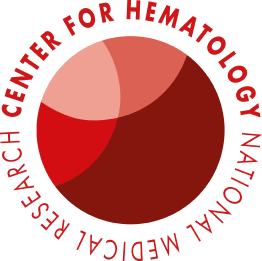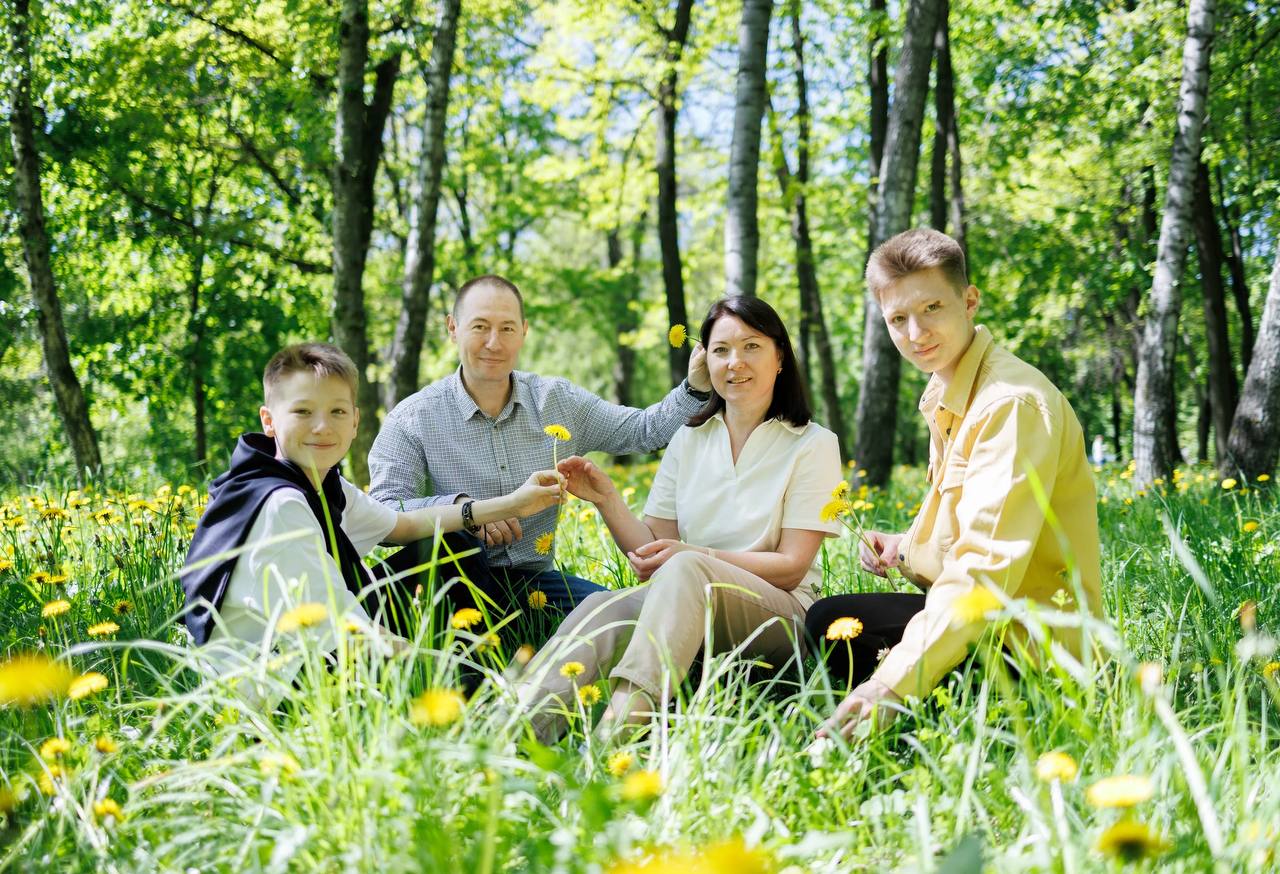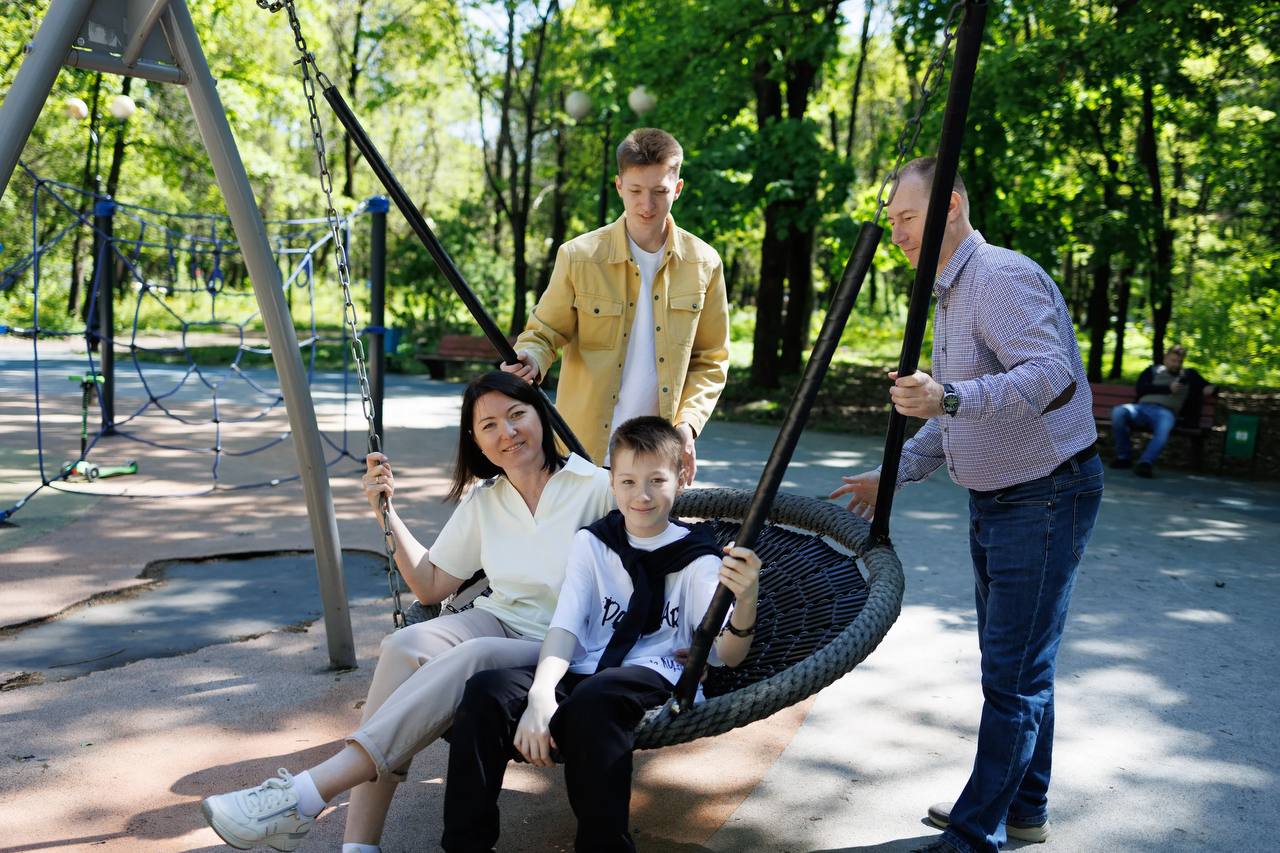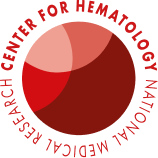"All that will be needed from you is peace, tranquility and grace." These words of her attending hematologist became a life-affirming motto for Julia Gubaidullina. 13 years ago, Julia faced a serious choice. During her second pregnancy, she was diagnosed with primary mediastinal B-cell lymphoma.
Quote from the book "Dossier on Little Che" "There is no such thing as a hopeless situation. Remember this statement carefully. There is a way out of any situation, even if at first glance it is an absolute dead end. You just need to stop panicking and bang on the locked door - of course, it will not open. If the entrance is tightly sealed, sit down calmly, drink tea, calm down and look around: it is likely that you will see a hole in the wall or understand where you can make a tunnel."
Julia was helped to find that "hole in the wall" at the National Medical Research Center for Hematology of the Ministry of Health of Russia. That is why she agreed to participate in the project "I Will Live!" without hesitation. By her example, she wanted to show that even in the most seemingly hopeless situations, there is a way out.
Julia lives in Podolsk. Together with her husband, she has two children. She works in the confectionery business. February 2024 marked the 13-year anniversary since the end of her treatment.
"I was diagnosed with primary mediastinal B-cell lymphoma when I was pregnant with my second child. That year was generally very difficult. At first, my arm hurt. Doctors diagnosed thrombosis. I went with this diagnosis for two months. I wouldn’t allow the doctors to take an X-ray. I was afraid that it would affect the baby. As a result, when I got to the seventh City Hospital in Moscow, the doctors said: ‘It's not just about saving the child anymore, but it's about you. We don't understand what's going on with you.’ I was really getting worse and worse, and the doctors decided to do an X-ray with contrast. That's when the tumor was found. Gynecologists were against continuing the pregnancy. All of the doctors generally had the same consensus. Even before the final diagnosis, I was told that with the diagnosis of thrombosis it would be difficult to carry to term and give birth to a child. And when the diagnosis became known, they said with one united voice: ‘It hasn't been long, just over 12 weeks. While there is a chance, let's terminate the pregnancy. It's a very big responsibility. If we save the pregnancy, everything could end badly.’ I was already starting to feel the baby. My husband and I understood that there could be consequences, but we decided for ourselves: if there is one chance in a thousand, then we will save the pregnancy," says Julia.
Julia was transferred to the Institute of Hematology, now the National Research Institute for Hematology of the Ministry of Health of Russia. At that time, pregnant women like Julia were only treated here. From that moment, complex and long-term treatment began.
"Thank God, on my way I met Yana K. Mangasarova, to whom I am insanely grateful. She is the only one who gave me hope, saying that there are chances and they work with patients like myself. I still have her words in my head: ‘All you will need is peace, tranquility and grace.’ I was admitted to the Center at 16 weeks of pregnancy, and chemotherapy would begin on the 24th week. Since the tumor no longer fit in my chest, a large lump appeared on my neck. I began to suffocate. I couldn't sit, lie down, or sleep. I was told: ‘We can't wait any longer.’ Once a week they began to carry out gentle chemotherapy courses. There were 12 courses in total.”
Fear of hair loss
"I had never encountered such a disease before. I had no understanding of what happens after chemotherapy. So, when I was told that my hair would fall out, it was a real tragedy for me. Subsequently, I realized that this was one of the ‘lesser evils.’
Some will say: ‘Worried about the hair, but not worried about the child?’ I didn't know how I would be treated and what the consequences would be. I was just told that it would be difficult, but it was possible to save the child. At the initial stage, this was enough for me. At that time we had no phones or mobile Internet, and I had nowhere to get information about my diagnosis. I spent my time reading and knitting. Being pregnant, I was placed in a separate room. I spent my time there, alone, before giving birth. Of course, I talked to other patients, but very rarely.
But in the process of treatment, I already understood that there could be consequences. I understood that I had taken on a huge responsibility for the child. Was it scary? Of course it was! But, I completely trusted the doctors. I really believed that everything would be fine with me and the baby.
I was very strongly supported by my family and my husband. All of my relatives live far away. Therefore, I traveled this road almost alone with my husband. My father-in-law was with us. The year I got sick, we buried my mother-in-law. Therefore, it was very difficult for them, as well as for me."
About the separation from her eldest son
When Julia fell ill, her eldest son was just over two years old. Circumstances forced the young parents to take the baby to Julia's parents in the Orenburg region.
"Parting with my eldest son was perhaps the most difficult ordeal during that period. I understood that my husband had to work, and I was taken to one hospital or another. Our son had to be sent to my parents in the Orenburg region. No one imagined that it would be for so long. When all was said and done, my son lived with my parents for one year. I am very grateful to them. They put him in daycare. It was there that he began to talk well. There was no video connection then. We couldn't see each other and communicated only by phone. These conversations were very difficult for me. I was very upset that I couldn't be around. After a while, he started refusing to answer the phone. And I decided that while I was in treatment, I wouldn’t torment myself or him. I had to control myself. Later, when we discussed it, my mother admitted that it was hard for him. At daycare, the children told him that his mother had abandoned him. After a while, when his grandmother would come to pick him up, he would say: ‘My mother did not leave me, here she is, my mother.’ He probably thought that I wouldn't come back, or that I was gone and they just didn't want to tell him. On the day when we arrived with his younger brother, he, of course, cannot remember his emotions, but I still remember this little boy with round eyes. When he saw me, he froze for a few seconds, and then very carefully came up and hugged me. He remembered Mom with long hair, and I came back with a very short haircut. It was probably one of the hardest and at the same time happiest moments."
Chemotherapy, toxicosis and emotions
Doctors explained that if it were not for the pregnancy, the duration of treatment could be half as long. However, instead of 4 months, Julia had to be treated for almost 9. During Julia's pregnancy, she underwent 12 courses of gentle chemotherapy. She had severe toxicosis, and antiemetic drugs were not allowed.
"I couldn't eat anything. I was very worried about how the child would develop and what he would get during chemotherapy. But at the ultrasound, gynecologists said, ‘Don't worry, the baby will take what he needs.’ I forbade myself to cry. Maybe it wasn't quite right. Emotions accumulate inside and as a result come out in waves. I had two breakdowns when I cried all night. In general, I can only now assess what we actually went through."
Each screening like a test
"I will always remember the director of the Institute of Obstetrics, Roman G. Shmakov, who was with me throughout my pregnancy and delivered my son. He collaborates with Yana Konstantinovna. Once every two months I went to him for all sorts of screenings and every single time my heart would stop. After I heard: ‘All five fingers on one hand, five on the other hand, the heart is beating,’ I would leave with some comfort. Doctors cannot predict with 100% how the delivery will take place. Of course, they are doing their best, they understand that there is every chance, but no one can give guarantees. Once Yana Konstantinovna shared with me that she was very worried about each of us, although she never showed it and always talked very calmly."
Royal birth
Julia was sent to the National Medical Research Center of Obstetrics, Gynecology and Perinatology named after Academician V.I. Kulakov of the Ministry of Health of the Russian Federation for childbirth.
"It may sound strange, but the coolest time was when I was taken to gynecology to give birth. I had a short break from the hospital and from the IVs. All girls with hematology are sent for Caesarean sections. I was also to have a Caesarean, but Roman Georgievich, literally three days before the birth, decided that I should try to give birth myself. For me, this was quite the news. I had already relaxed and said, ‘No, no, I don't want to do it myself anymore.’ But he calmed me down and convinced me that I was physically ready for a natural birth. I was scheduled to deliver the next day. Just in case, the operating room was ready with anesthesiologists. It was a kind of solemn day for me. There were a lot of doctors and all with their own equipment. Everyone was kind of ready. I gave birth, you might say, like a queen. And it turns out that I was almost the first one to give birth on my own. When the baby was born and they showed him to me, and I realized that everything was fine and calmed down. After giving birth, I went home for a month. We took the baby home three weeks later. I needed to return to the hospital for further treatment. Ahead of me were two high-dose chemotherapy courses and 20 sessions of radiation therapy. A relative from Ufa stayed with the baby during this time. Moreover, she herself had a two-year-old girl, whom she left to her grandmother and came to babysit mine. My husband had to work. It wasn’t possible to allow no one in the family to work. In the second month, another relative arrived."
The realization of everything
"The realization of everything that I had gone through came much later. When I was discharged from the hospital, I had a small child. I didn't have time to analyze it. I started reading specifically about my diagnosis much later. Now, I understand that I did everything right, as far as it was possible then. I completely trusted the doctors and did not allow the thought that anything could happen to me or the child creep in. Yes, there was fear, there was a lot of responsibility, but I was convinced of a successful outcome.
This is the most important thing when you are undergoing treatment, not to allow bad thoughts. I was thinking about the older one. There was a lot of responsibility for the younger one. There was a lot of support from my husband. He did not allow me to have these bad thoughts. Although, after a while, my husband admitted that his coworkers, upon learning about our situation, said: ‘Young people, you do not understand what you are doing. It is better to terminate the pregnancy. You can have another child later.’ They thought we were making a big mistake.
I think it's even harder for loved ones at such moments. When I had a temperature right under 42 degrees after the first high-dose chemotherapy and my dad called, I got up, put on a smile and talked to him as if nothing was wrong. Although he told me later that it was clear how I felt. My mood was perceptible even through conversations. They were also very worried, but they didn't show it. They raised their grandson, gave themselves completely to him and waited for everything to end well."
What now?
"I'm happy now. You know, the first time after you leave the hospital, you realize that the chemotherapy is over. Although, a lot of people return for further treatment after a very short time. I even knew some people like that. After I returned to the hospital after giving birth, I began to communicate with the girls, as I was admitted to the general ward. I heard so many stories. It turns out that everything was different for everyone. I even know a girl who had a very rapid relapse. She is no longer with us. She had a two-year-old girl at that time. This is very scary. And when the treatment ends, you realize that you have been discharged, you seem to have left, but you are uncomfortable with the fact that you do not understand how protected you are now. Yes, the chemotherapy is over, but what if you have a relapse. What if the tumor starts to grow again? What if something was overlooked? What if there are metastases somewhere? It seems to me that such fears accompany every former patient, but I've always pushed these thoughts away. It is very difficult to go for the first CT scan and to take the first tests. At first, this should be done every three months, then every six months, then once a year. And so, when these breaks lengthen, you are again overcome by some kind of fear. At first you think: it is necessary that the youngest be at least five years old. Then you realize that you need him to at least finish kindergarten and go to the first grade. Then you think: no, now he’s in the first grade and he’ll need my help. The children need to be older so that they at least somehow feel and remember their mother. It was these thoughts that made me stay at home and change my profession from accountant to pastry chef. After treatment, I went to work for almost a year but realized that the children were small and that they needed my care. I wanted them to remember their mom. I have to spend as much time with them as possible in this life, because no one has canceled the relapse. Of course, I am now trying not to allow these thoughts. I get checked every year, although it's very difficult every time. I love living here and now. I like taking my children to school and I like meeting them after. I like to cook for them and buy them clothes. I like to travel with my family and visit my hometown.”
About the project “I Will Live!”
"I have never liked to talk about having experienced such a terrible disease in my life, because I do not tolerate self-pity. It's memories and experiences again ... I don't like to read about it, because it creates additional fears ... But when I got a call and was offered to participate in the project “I Will Live!”, I agreed without hesitation.
I think the project is very necessary and important, because the disease has not gone away. Every year I meet friends and family who have not only some blood diseases, but cancer in a broad sense. I joined the project to support all the people who find themselves in such a situation. I would like to show by my example that the disease is curable and that life goes on after treatment. I especially want to support pregnant women: Do not lose heart, instead you need to believe that everything will be fine. The motto of every woman in such a situation, as Yana Konstantinovna said, should be: ‘Peace, tranquility and grace.’







